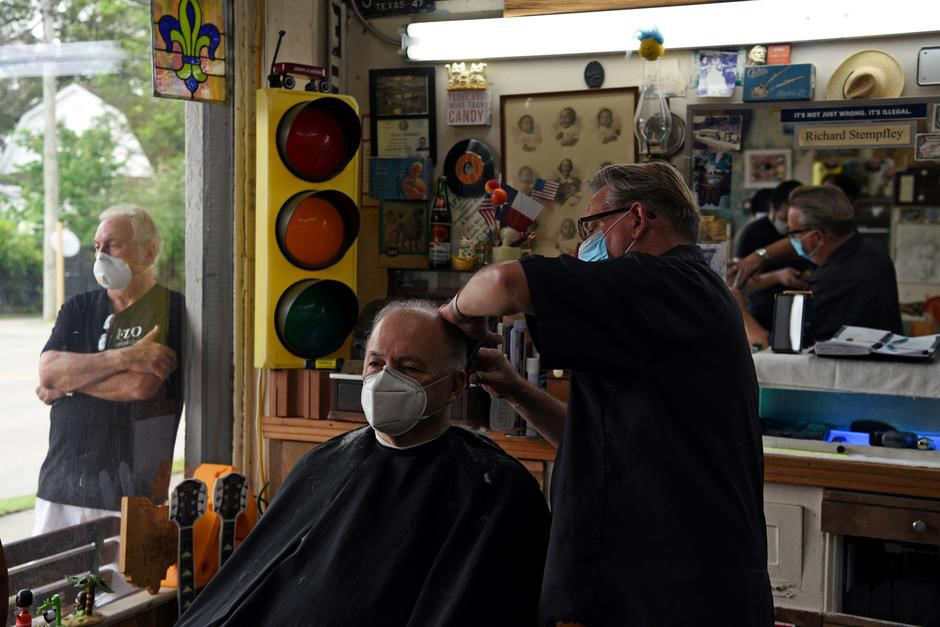WASHINGTON/NEW YORK, (Reuters) – The U.S. government reported more catastrophic economic fallout from the coronavirus crisis yesterday as the pandemic pierced the very walls of the White House and California gave the green light for its factories to restart after a seven-week lockdown.
A day after the White House confirmed that President Donald Trump’s personal valet had tested positive for the virus, Trump told reporters that Katie Miller, press secretary to Vice President Mike Pence, had also been infected. She is married to senior Trump aide and immigration policy hard-liner Stephen Miller and travels frequently with Pence.
The back-to-back diagnoses of individuals close to Trump, Pence and the White House inner circle raised questions about whether the highest levels of government are adequately safeguarded from infection.
“We’ve taken every single precaution to protect the president,” White House spokeswoman Kayleigh McEnany told reporters.
Earlier in the day, the Labor Department reported the U.S. unemployment rate rose to 14.7% last month, up from 3.5% in February, demonstrating the speed with which the workforce collapsed after stay-at-home orders meant to curb the outbreak were imposed across most of the country.
Worse economic news may be yet to come. White House economic adviser Kevin Hassett said the unemployment rate was likely to climb to around 20% this month. The jobless rate for April already shattered the post-World War Two record of 10.8% set in November 1982.
The economic devastation has heightened the urgency of governors’ efforts to get their states’ economies moving again, even though infection rates and deaths are still rising in parts of the country.
California, the first state to issue stay-at-home orders on March 19, partially reopened shuttered commerce yesterday. Retailers such as bookstores, jewelers, clothing merchants, sporting goods shops and florists were permitted to begin offering curbside pickup and deliveries, while manufacturing and warehouse facilities were allowed to resume operations if they met infection-control requirements.
Governor Gavin Newsom, a Democrat, said California had managed to flatten its infection curve in recent weeks, allowing the state to safely proceed with gradually restarting the economy.
More than 77,000 Americans have died from COVID-19, the respiratory illness caused by the novel coronavirus, out of more than 1.29 million confirmed cases, according to a Reuters tally.
Elderly individuals and people with underlying chronic health conditions have been the most vulnerable.
But New York Governor Andrew Cuomo yesterday reported the death of a 5-year old boy from a rare inflammatory syndrome believed to be linked to the coronavirus, highlighting a potential new pandemic risk for children.
Just as minorities have been especially hard hit by the virus itself relative to their population size, African Americans and Hispanics also suffered disproportionately greater job losses in April – at 16.7% and 18.9%, respectively, the Labor Department data showed. The jobless rate was also higher among women, at 15.5%, compared with 13% for men.
Rita Trivedi, 63, of Hudson, Florida, was furloughed as an analyst at Nielsen Media Research on April 23 and has struggled to secure benefits from the state’s troubled unemployment system. She fears running short of money to cover her husband’s medical bills and other expenses.
“I’m more than anxious, I’m more than worried – it’s ‘can’t sleep’ kind of anxious,” Trivedi said. “I’m just so tense thinking about these things and how to manage.”
Trump, seeking re-election in November, initially played down the threat posed by the coronavirus, and has given inconsistent messages about the expected duration of the economic shutdown and its consequences.
“Those jobs will all be back, and they’ll be back very soon,” he told Fox News on Friday.
Newsom said California, home to 40 million residents with an economy ranking among the top five or six in the world, was doing worse than the nation as a whole, with unemployment running over 20 percent.
But he said roughly 70% of California’s economy was eligible to reopen “with modifications” under his plan, though it remained to be seen how many businesses would jump at the chance, and how many customers would immediately return.
In Los Angeles, few retail businesses appeared to be open in the downtown area. It also was unclear how much, if any, assembly line production in California had yet resumed.
Electric car manufacturer Tesla Inc was aiming to restart its factory in Fremont, California, on Friday, Chief Executive Officer Elon Musk wrote in an email to staff.
But a health official in Alameda County, where the plant is located, said local lockdown measures remained in effect and supersede Newsom’s relaxation of statewide restrictions.
“We’ve been working with them, but we have not given the green light,” health officer Erica Pan said of Tesla.
At least 40 of the 50 U.S. states are taking steps to lift restrictions affecting all but essential businesses – including Arizona, Mississippi and South Dakota, which on Friday all reported record numbers of cases.
Public health experts warn that reopening prematurely, without vastly expanded virus testing and other safeguards, risks fueling renewed outbreaks. They also say the state-by-state hodgepodge of differing policies may confuse the public and undermines social distancing efforts.





